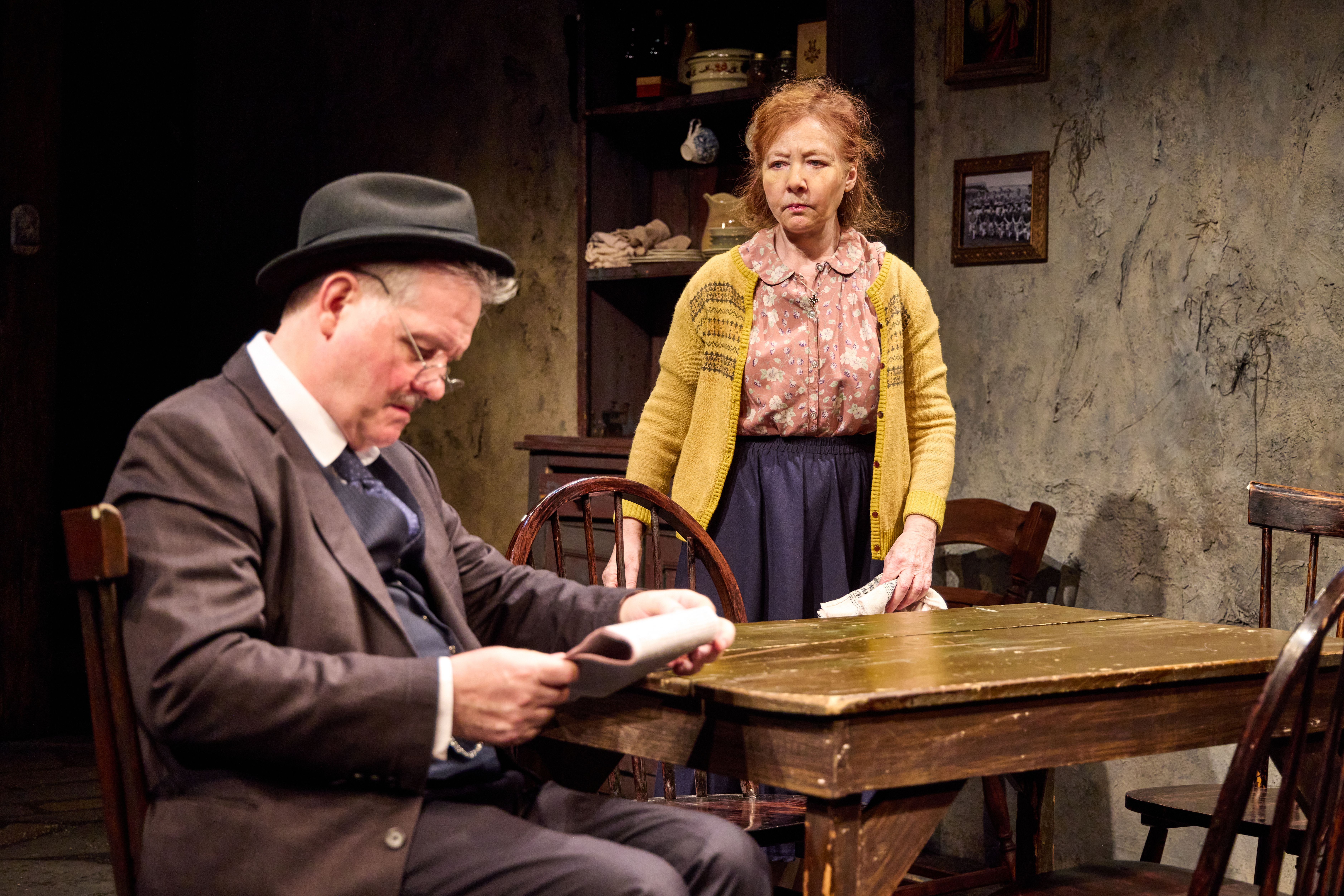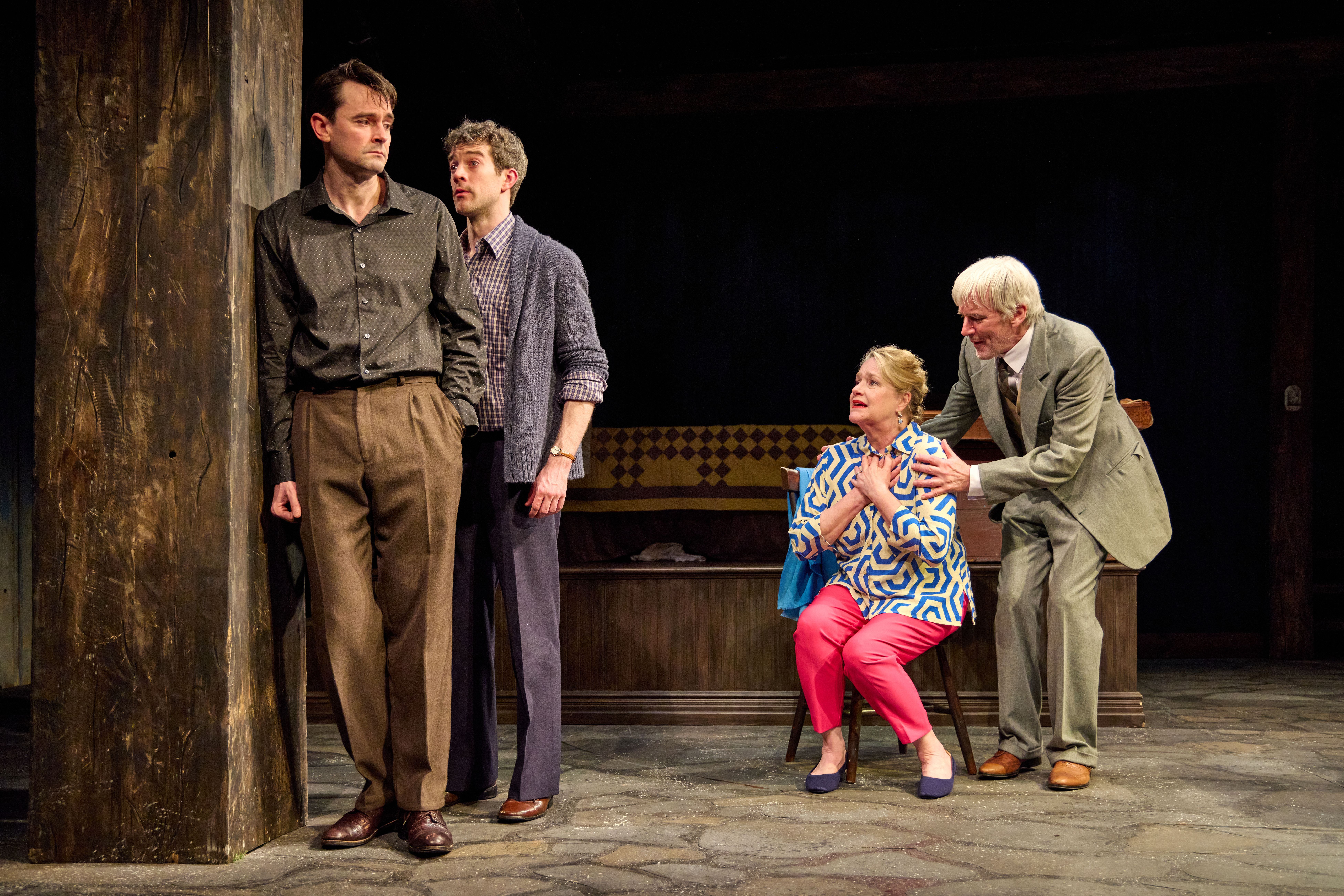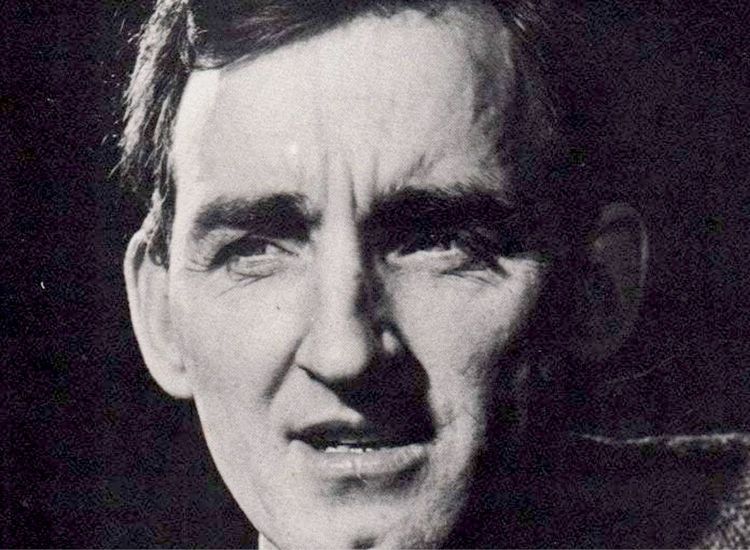With a longing look back in the early morning rain, the Irish Repertory Theatre’s revival of “Philadelphia, Here I Come!” waves one more heavy-hearted farewell to home. A classic lament for the wayward bound, the Ciarán O’Reilly-directed production returns to the Francis J. Greenburger Mainstage for the first time since 2005, as part of Irish Rep’s celebratory season themed “The Friel Project,” playing through May 5.
Friel’s breakaway drama, while it may be indicatively Irish, hums a familiar tune for the whole world to hear, and whose tears will sting the hearts of generations with a timeless twinge. This idealistic tale of the emigrant encases the dichotomy for anyone coming-of age: the rapture of a new life, against the agony of saying goodbye.
“Philadelphia, Here I Come!” depicts the life of 25-year-old Gar O’Donnell (David McElwee) from the fictitious Ballybeg in Donegal, who on the eve of leaving on a jet plane set to take off for America, considers in the fullest scope of his recollection all he is about to leave behind. Trapped by the immobility and limitations of his rural life, Gar finds himself at his wits end in a country repressed by repetition, restriction, the infuriating doldrums of ordinary gossip and the predictable taste of pints.
With only the desiring voice of his inner self (A.J. Shively) to negotiate and encourage him, and the ecstatic sponsorship of his Aunt Lizzy (Deirdre Madigan) endorsing the promise of new life in Philadelphia, Gar imagines vividly his future in both worlds: an Ireland that pulls him backward, where all his dreams die, and an America that thrills him with every pending fulfillment, where the potentiality of any dream can be lived.
Yet as Gar bolsters his reasons to leave, compiling his resentments towards those perceived to have disappointed him—a provincially ambitious ex-sweetheart Katie (Clare O’Malley) and his emotionally invisible father, S.B. (Ciarán O’Reilly)—and mourns the lives that his town has wasted—his would-be father Master Boyle (Patrick Fitzgerald), housemaid Madge (Terry Donnelly) and his own dearly departed mother—he begins to question what exactly will change for him in America, and questions the legitimacy of his own memories, whether he is remembering his hometown fairly, as he pleads through the silence for one last cause to stay.
At the outset of the first act, the performance seems not altogether apparent for takeoff, as the particularly muffled and detached dialogues were not necessarily obvious to the audience to be a deliberate (and if so, forced) representation of a bored social life in Ballybeg. Through some points of flat and inert transition, the act strains to find its landing, as actors precariously trounce between balancing the energy of the performance with the retrofitted language of Friel’s characters. An exception may be taken for the gusto and charm with which A.J. Shively reenacts golden-age Hollywood damsels, Elvis Presley, and ’60s-era BBC television presenters with such aplomb, exemplifying how easily it was to caricature, even by 1964 standards, an out-of-touch American dream.
For various scenes, the action of this production stumbles over its pace, miss-stepping on momentum, personified with slight irony by the interspersed outbursts of McElwee and Shively’s flawless and expressive traditional jigs, which in its peculiar unexpectedness felt like a hangover from the St. Patrick’s Day parade.
With a cleverly economized set design by Charlie Corcoran (including a translucent wall from which memory scenes begin and actors can emerge on stage, literally bringing past into present) albeit a partially-recycled one (whose pastoral home’s paneling might be recalled from Irish Rep’s 2023 production of “Translations”), and accompanied by archetypal music interludes between acts (designed by Ryan Rumery and M. Florian Staab), this Friel revival initially presents itself as predicable and antiquated, as a production symptomatic of the story it strives to convey. From this glance, audiences might expect to view a classic production of Friel in the least desirable way; that is, were it not for the performances of this majestic ensemble.
On the wings of its performers, the production takes to the skies midway through the first act, and soars through the final act, as O’Reilly’s direction finds greater realization in its conflicts between unspoken desire and repressible indifference. This production is propelled by several outstanding performances, including Deirdre Madigan’s boisterous and touching performance as the childless aunt, to her “quiet man” counterparts Con (Patrick Fitzgerald) and Ben (Peter Cormican), and a mockingly trite hometown alpha Ned (James Russell) with sidekicks Tom (Tim Palmer) and Joe (Emmet Earl Smith) who bring amusing, genuinely exceptional banter. Terry Donnelly brings an extraordinarily crushing, embittered restraint to her role as Madge, a woman forgotten to the world, and her final monologues send through the spine a chill of despair and regret.
Ciaran Byrne offers up a cheekily meek part as Canon, whose shared performance with O’Reilly, during which Canon and S.B. play a slothful checkers game with resolute disinterest, is among the play’s most comically mournful moments.

Ciarán O'Reilly, who plays S.B. and directs the 2024 production, and Terry Donnelly, as Madge.
In their dynamic leading roles, David McElwee and A.J. Shively are a phenomenal pair as twin characters—Gar, public and private—as they shadow each other with imperceptive ease. McElwee and Shively emit one another’s emotions as symbiotically as they evocatively entertain. In an ideal portrayal of Gar, McElwee exudes undeniable reality; a complete picture of youth departing into adulthood in all its excitement, letdown, and doubt. McElwee speaks every word with pinpoint authenticity, and reflects Shively’s every emotion within him with seemingly telepathic perfection. As Gar’s inner-life, Shively entrances audiences with the pure, tragic desire of the soul to be free; and whether animating the emptiness, entertaining flights of fancy, or giving voice to unsaid truths, Shively uplifts audiences with his every vitality.
With a welcome return to Irish Rep’s stage, Ciarán O’Reilly creates a magnificently stoic performance as S.B. O’Donnell, with expressions paralyzed by ritual and burdened over by routine and obligation. It is O’Reilly’s final scenes, in which father and son O’Donnell make a last, delicate attempt to connect over a worthwhile childhood moment, and S.B.’s own gentle, tearful, eluding memory of his son, are the finest of the production, and are felt in the heart of its audience.
When the sins and histories of our fathers repeat themselves, Friel leaves us to wonder: can nostalgia be escaped? Do we fly away from our destiny, or towards it? Where do we want to be?
As yet another generation leaves Ireland’s shores for more affordable and attainable opportunities, this story is for Irish ex-pats both well-worn and timely. Whether you are fleeing a housing crisis or have ever left for a better life, “Philadelphia, Here I Come!” will find you feeling close to home.
For tickets, visit here.










